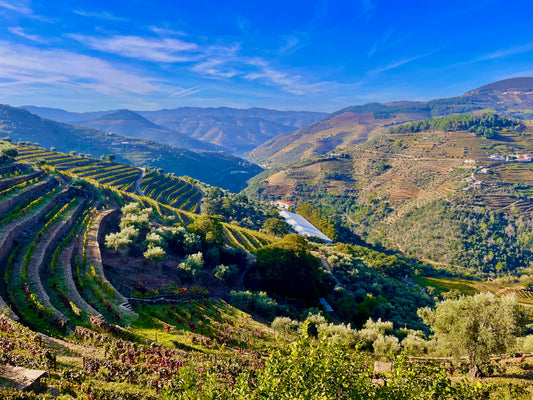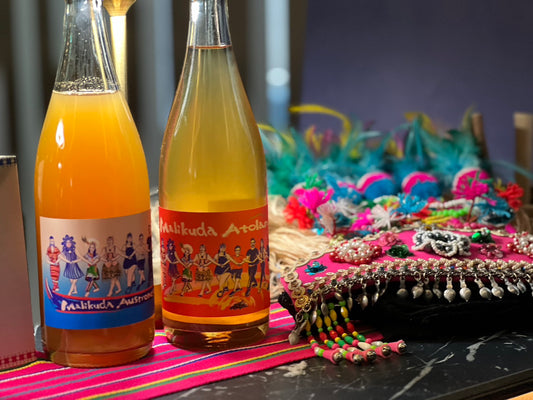|
Earlier this year, I had the privilege of visiting Tutankhamun’s tomb. I was fascinated to see that the delicate engravings on the amphoras (there are 23 of them in the annexe to the burial chamber) were actually an ancient form of wine label: the Ancient Egyptians had an appreciation of terroir some 2,000 years before the Burgundian Cistercian monks. These engravings also convey wines’ connective power. These amphoras were celebratory items to enjoy in the afterlife and reflected the Egyptians’ belief in wine’s ability to commune with the gods.
We have moved on from 1324 BC, and yet we can’t doubt wine’s engagement with and ability to evolve with culture. I grew up in the UK but spent much time in the US, so I can appreciate this in current trends on both sides of the Atlantic: wine and CBD, NFTs, celebrity wine brands, wine tastings in reality TV shows, from dating in The Bachelor to The Real Housewives of Beverly Hills. Last week I was asked by a UK newspaper to comment on the TikTok trend of ‘chicken wine’ – La Vieille Ferme rosé - that’s been going viral on social media. These shows and platforms have helped make wine a relatable beverage by emphasizing wine as an experience which should be approached with curiosity, rather than trepidation.
The majority of wine drinkers want to have fun. As wine writer Andrew Jefford put it: ‘Invite life into wine – with imagination, with humour, with fun. Take it off the rails; turn it inside out, write all over it; reclaim it for yourself. There are no limits, and nothing is sacrosanct.’
There’s no official handbook. I’ve been involved in myriad different ways to enjoy wine, from launching my business with wine-centric supper clubs in my own home, creating wacky videos for Jamie Oliver’s Drinks Tube, hosting an online wine and hip-hop tasting with podcaster Jermaine Stone (a self-defined ‘wine culturalist’) to most recently judging a wine tasting conducted as a spectator sport. This last was Wine Rival in Los Angeles, a live event open to everyone, where competitors blind taste wines in the hope of winning $2,000. I will be judging at the finale in Chicago this October where the winner will win $25,000.
Jefford’s dictum to ‘invite life into wine’ shouldn’t be confined to wine. Wine can be as intimidating as the arts – but both can reach a wider audience by cross-pollinating. I’ve always loved blending wine to music, art and literature, and a recent experience pairing wine to opera at Opera Holland Park in London proved that this is not a gimmick. I was asked to curate a tasting to promote a debut (Mark Adamo’s Little Women). By matching five North American wines to the four main operatic characters as well as the primary literary themes, the tasting helped sell tickets to a younger demographic whilst also helping people see wine and opera in a whole new, engaging light. On the other side of the Atlantic, I conducted an interpretation of Kanye West through Spanish wine in a contemporary art gallery in Laguna beach. It was a complete sell-out and attracted people of all ages who would never usually go to wine tastings.
Whether you believe wine is an innate part of pop culture or the arts, wine is always political.
Just watch Ken Burns’ renowned documentary ‘Prohibition’, which raises questions that are as relevant in the 21st century as they were during the early 20th. These include questions of individual rights and responsibilities and the role of government in citizens' lives. For more current examples of wine in politics and socio-economic movements, consider George W Bush’s boycott of French wine during the Iraq war, the Brexit tariffs, the effects of climate change such as the worldwide forest fires, and the impact of George Floyd’s death which reflected a common history of violence against Black people that united protesters in a renewed global movement and consequently has made all industries think how they could be doing better in regard to diversity and inclusivity.
Constellation Brands is a major wine brand which has now built Diversity, Equity and Inclusion (DEI) initiatives into its strategic business priorities. These range from making a conscious effort to hire from the BIPOC community as well as supporting and investing in minority-owned businesses. At the end of 2022 it was announced that Constellation would be investing $100 million in Black/African American, Latinx and minority-owned businesses over the next 10 years. Although it is important to be sceptical about companies claiming to make sweeping changes, this does prove the socio-economic-political effects of wine.
Tahiirah Habibi, founder of the US-based Hue Society, understood that BIPOC communities were often highly suspicious of wine, with many viewing it as a beverage enjoyed mainly by Caucasians. ‘I knew that if I brought wine to the culture instead of trying to shove the culture into wine, it would be different,’ she acknowledges. She therefore created an annual week-long Wine and Culture festival which is now hosted in Atlanta and centres on promoting Black wines such as Pur Noire, Black-owned drinks brands and businesses, and also champions various brown and indigenous leaders in the wine and drinks industry. This year combined reggae, cookouts highlighting cuisines specifically within the African diaspora, as well as holding an event entirely on Black women’s hair. This festival has now become a Black cultural mecca with an accelerating fan base and a highly regarded platform for BIPOC brands and businesses. Habibi has done a fantastic job at combining wine, the arts and the political into something relevant, entertaining and empowering, both in the community which she has built and by offering opportunities to those previously overlooked.
Wine communication is about empowerment – whether being savvier about wines in relation to climate change or choosing to support Black-owned businesses. This is what motivates me as a wine communicator. Wine says so much about us as a society and it should remain a vibrant part of the zeitgeist. Far from dumbing wine down, connecting it to the wider culture – from hip-hop to politics – highlights its power. It can make us realize our common humanity. As the wine writer Gerald Asher wrote in regard to Paul Lukacs’ book Inventing Wine (2013), ‘Lukacs helps us understand how wine, like music, books, or anything else we create, is a cultural reflection of who we are and how we live.’
Maybe we are not so different from the Ancient Egyptians after all.
|



